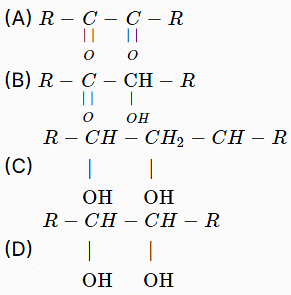Which of the following will be oxidized by \(HIO_4\)?


- 1, 2 and 3
- 1, 3 and 4
- 1, 2 and 4
- 2, 3 and 4
The Correct Option is C
Solution and Explanation
The characteristics property of periodic acid is the oxidative cleavage of bonds with oxidisable groups such as 1,2-diols, ∝-hydroxy carbonyl compounds, 1,2-diketones, etc.For two adjacent oxidisable groups, one molecule of reagent is used which oxidises ketones to carboxylic acids and alcohols are oxidised to aldehydes by HIO4.The reaction of given compounds with HIO4 can be shown as:
Top Questions on Oxidation Number
- In an oxidation-reduction reaction, what happens to the oxidation state of the central atom in \( \text{MnO}_4^- \) when it is reduced to \( \text{Mn}^{2+} \)?
- JEE Main - 2025
- Chemistry
- Oxidation Number
- The group reagent NH\(_4\)Cl (s) and aqueous NH\(_3\), will precipitate which of the following ion
- KCET - 2025
- Chemistry
- Oxidation Number
- In the reaction \( \text{Zn} + 2\text{Ag}^+ \rightarrow \text{Zn}^{2+} + 2\text{Ag} \), what is the oxidation state of zinc in \( \text{Zn} \) and \( \text{Zn}^{2+} \)?
- MHT CET - 2025
- Chemistry
- Oxidation Number
- What is the oxidation state of sulfur in \( \text{H}_2\text{SO}_4 \)?
- MHT CET - 2025
- Chemistry
- Oxidation Number
- What is the oxidation number of sulfur in sulfuric acid (H$_2$SO$_4$)?
- MHT CET - 2025
- Chemistry
- Oxidation Number
Questions Asked in JEE Main exam
Which one of the following graphs accurately represents the plot of partial pressure of CS₂ vs its mole fraction in a mixture of acetone and CS₂ at constant temperature?


- JEE Main - 2026
- Organic Chemistry
- Let \( ABC \) be an equilateral triangle with orthocenter at the origin and the side \( BC \) lying on the line \( x+2\sqrt{2}\,y=4 \). If the coordinates of the vertex \( A \) are \( (\alpha,\beta) \), then the greatest integer less than or equal to \( |\alpha+\sqrt{2}\beta| \) is:
- JEE Main - 2026
- Coordinate Geometry
- Three charges $+2q$, $+3q$ and $-4q$ are situated at $(0,-3a)$, $(2a,0)$ and $(-2a,0)$ respectively in the $x$-$y$ plane. The resultant dipole moment about origin is ___.
- JEE Main - 2026
- Electromagnetic waves
Let \( \alpha = \dfrac{-1 + i\sqrt{3}}{2} \) and \( \beta = \dfrac{-1 - i\sqrt{3}}{2} \), where \( i = \sqrt{-1} \). If
\[ (7 - 7\alpha + 9\beta)^{20} + (9 + 7\alpha - 7\beta)^{20} + (-7 + 9\alpha + 7\beta)^{20} + (14 + 7\alpha + 7\beta)^{20} = m^{10}, \] then the value of \( m \) is ___________.- JEE Main - 2026
- Complex Numbers and Quadratic Equations
- The work functions of two metals ($M_A$ and $M_B$) are in the 1 : 2 ratio. When these metals are exposed to photons of energy 6 eV, the kinetic energy of liberated electrons of $M_A$ : $M_B$ is in the ratio of 2.642 : 1. The work functions (in eV) of $M_A$ and $M_B$ are respectively.
- JEE Main - 2026
- Dual nature of matter
Concepts Used:
Oxidation Number
Oxidation number, also called oxidation state, the total number of electrons that an atom either gains or loses in order to form a chemical bond with another atom.
Oxidation number of an atom is defined as the charge that an atom appears to have on forming ionic bonds with other heteroatoms. An atom having higher electronegativity (even if it forms a covalent bond) is given a negative oxidation state.
The definition, assigns oxidation state to an atom on conditions, that the atom –
- Bonds with heteroatoms.
- Always form ionic bonding by either gaining or losing electrons, irrespective of the actual nature of bonding.
Oxidation number is a formalized way of keeping track of oxidation state.
Read More: Oxidation and Reduction
Way To Find Oxidation Number Of An Atom?
Oxidation number or state of an atom/ion is the number of electrons an atom/ion that the molecule has either gained or lost compared to the neutral atom. Electropositive metal atoms, of group I, 2 and 3 lose a specific number of electrons and have always constant positive oxidation numbers.
In molecules, more electronegative atom gain electrons from a less electronegative atom and have negative oxidation states. The numerical value of the oxidation state is equal to the number of electrons lost or gained.
Oxidation number or oxidation state of an atom or ion in a molecule/ion is assigned by:
- Summing up the constant oxidation state of other atoms/molecules/ions that are bonded to it and
- Equating, the total oxidation state of a molecule or ion to the total charge of the molecule or ion.